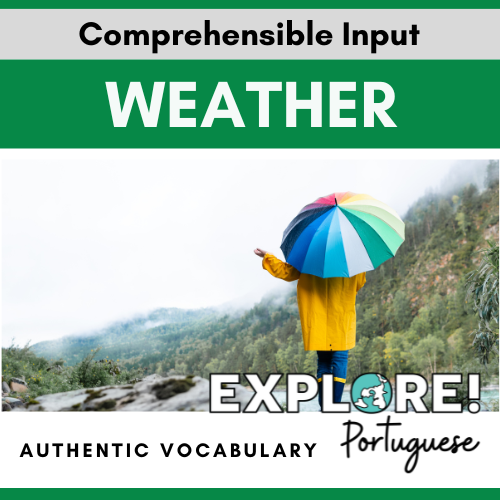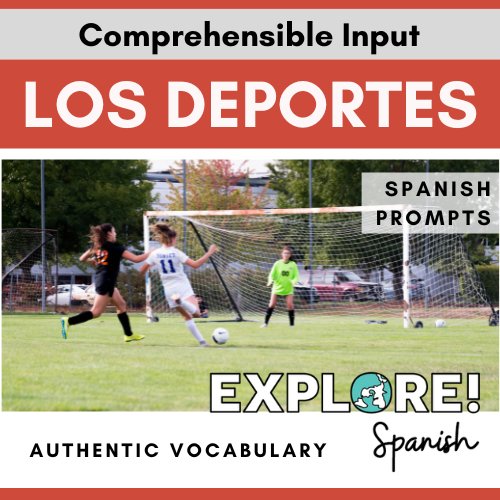Presenting at a Professional Conference - FAQ
You’ve been teaching for several years and your students are learning and growing under your care. It’s time to share your expertise with your colleagues!
I was doing a peer observation of a 4th year teacher, and I was impressed. Kaylee’s students were circulating to posters hanging around the room. At each station, kids scanned a QR code which led to an interesting online, paper, or verbal challenge. The activities were fun and varied, and students were engaged. It was a great lesson.
“If you’ve struggled with a problem in your classroom and have found a solution that works well for your students, then you’re qualified to present!”
After her observation, I told Kaylee, “You should do a presentation at our state world language conference. Teachers would love to see how you designed this lesson with a combination of technology and traditional tasks.”
“I don’t think so,” Kaylee told me. “I wouldn’t know what to say to all those experienced teachers. I’m still new at this.”
I hear variations of this objection a lot, but I’m here to tell you; you can and should take the professional step of sharing formally with your colleagues. Presenting forces you to dig deep into your own practice. This makes you a better teacher, it expands your influence, and it contributes to your colleagues and the broader profession.
If you’ve thought about presenting to your colleagues but are hesitant, this FAQ can help.
Presenting at a professional workshop FAQ
Q: I’m just a regular classroom teacher. Am I qualified to present to my peers?
A: If you’ve struggled with a problem in your classroom and have found a solution that works well for your students, then YES! You’re qualified to present.
Forget the idea that there are ‘gurus’ out there that you can never live up to. Teaching is a very challenging, multifaceted task that no one ever fully masters. Anyone who tells you otherwise is either lying or deluding themselves.
Presenting at a professional conference doesn’t mean you know more or are somehow better than other teachers. It simply means you’ve wrestled with some professional challenge and have discovered a solution that might help your colleagues in that aspect of their own practice. Although I’m a very experienced teacher, I’m so grateful for the perspective and experience of younger teachers who have taught me about new technology, shared current social trends in target cultures (and in my own!), and helped me stay current on educational best practices. We need each other! We need you!
Q. What should I present on?
A. Choosing your topic is probably the most important step in developing effective PD.
What is an aspect of teaching that…
You do especially well?
You really enjoy?
Solves a problem?
If it meets each of these criteria, it’s probably a great topic for you to develop into a PD session.
Here’s an example. Early in my career, I struggled with vocabulary instruction. I basically handed kids a list of words and then walked through each word telling kids what it meant. Vocabulary days were really boring and teacher driven, so I started looking for a better way to teach it. Over time I developed a student-centered, investigative approach to vocabulary introduction which worked much better than my traditional approach! I realized that if I was having trouble introducing vocabulary, my colleagues probably were too, so I developed a PD workshop on “Authentic Vocabulary Instruction”. This topic has become one of my most popular teacher workshops and the flagship product line of my little business! It all started with me identifying a problem, researching a solution, and implementing it successfully in my own classroom. (And blogging about it! Read more here!)
Authentic Vocabulary has become my flagship product line AND professional development topic!
What excites you in your classroom? Do you have a favorite way to teach a particular topic? A unique classroom routine? A fabulous application of tech tools? An effective approach to working with particular students? Unique knowledge of a lesser-known target culture? An engaging way to practice a skill? These are starting points for a helpful and impactful professional development session.
Often once you’ve identified your topic, the ideas will start flowing. I’ve mentored several younger teachers as they prepare PD; when their eyes light up and they start thinking of ideas faster than I can write, I know we’ve hit the PD jackpot. Or, as one friend told me, “I was so excited about our idea, last night I couldn’t sleep!”
Q: What if they don’t like me?
A: They will!
You can help by fostering realistic expectations for your session by carefully writing an accurate session proposal so teachers know what to expect.
Since I teach middle school, I spend a lot of time with novice learners. I once did a PD session on reading instruction, with a lot of strategies for beginners. About halfway through the session, someone asked “Will you be sharing activities for upper levels?” I was stunned… I had nothing for upper levels and therefore wasted my colleague’s time. I realized I needed to add “for novice learners” to my session description to accurately represent what my session would include.
“If it’s an aspect of teaching you do especially well, you really enjoy it, and it solves a problem.... it’s probably a great topic for a PD session!”
Put thought into your session title and description. Provide a clearly stated goal of your session with a phrase like “In this session we will examine.... We will explore three activities to… Participants will learn how to…. You will leave with resources for….” (and then, make sure you do those things!) Take a look at session proposals from past conferences to get ideas for writing an effective abstract. Most teachers will use these abstracts to decide which session to attend, so you want your abstract to be well-written and representative of what teachers can expect.
Q: What should I call my session?
A: Your session title should be brief and descriptive.
I do find the session titles to be tricky, and the title is usually the last thing I add. Here are some of mine:
Authentic Vocabulary Instruction
Practical Proficiency: Teaching students to use the language without making yourself crazy in the process!
Let’s Grow! Feedback, Rubrics, and Self-Evaluation
Listen Up! Interpretive Listening in the World Language Classroom
If your title can be clever, that’s a bonus. I often try to make a play on words or search a list of idioms related to my topic and see if I can turn one into a workshop title.
Every Trick in the Book: Reading instruction in the WL classroom
Giving the Gift of Gab: Teaching Interpersonal speaking with Novice learners and beyond
Survey Says? Using Social Media Quizzes for Reading, Writing, Listening, and Speaking
From Cameroon to Carolina: incorporating francophone Africa in your French class
H.E.L.P! High Engagement, Low Prep activities to implement in any WL class
(If you’d like to learn more about these and my other workshop offerings, reach out or visit my professional development page!)
Of course, identifying your topic and title is only the first step. Next you need to develop a useful workshop and find a place to present it. I’ll share ideas for this in my next blog post.
I’m happy to report that Kaylee shared her “QR Code Scavenger Hunt” at a PD session in our local school district. About 20 teachers attended and her idea was well-received. Several teachers tried the activity and some reached out to Kaylee for assistance as they developed their lessons. As a result, teachers updated their practice, students were challenged and engaged, and Kaylee was able to help others do something she is passionate about. Now she’s looking for other places to share her awesome idea. It was a win-win-win!
OK, now it’s your turn! What topic could you present on? Share in the comments!







